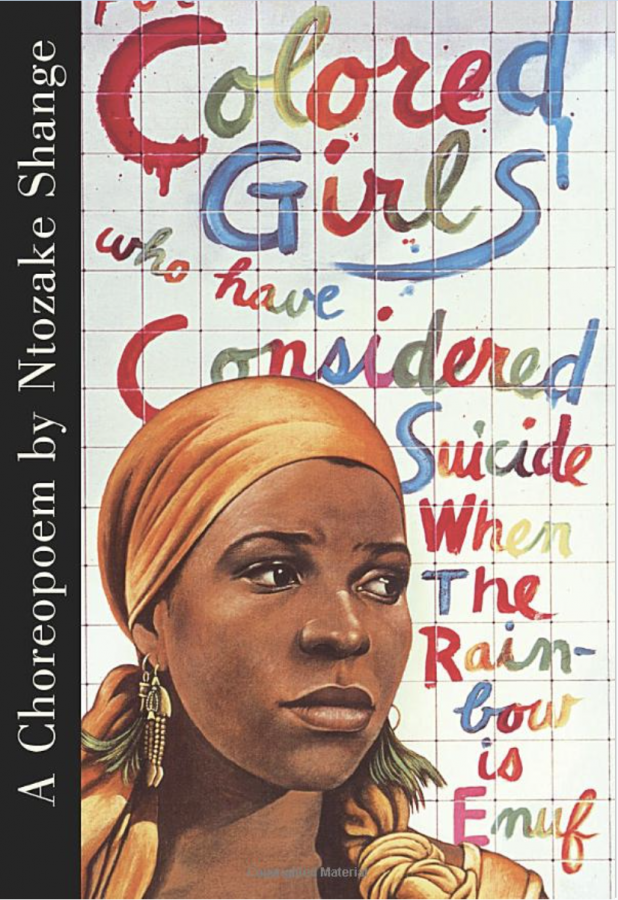Book Review: For colored girls who have considered suicide/ when the rainbow is enuf
February 24, 2021
On the cover of Ntozake Shange’s choreopoem, which is a term coined by Shange to describe how her work combines poetry, dance and music, is a drawing of a brown-skinned woman with worry wrought in her eyebrows. The orange scarf on her head has the same undertone as her skin. Behind her is the title drawn in paint with letters dripping against a white tiled background: “for colored girls who have considered suicide/ when the rainbow is enuf.”
In this choreopoem, seven characters, each referred to as “lady” and a color of the rainbow, tell a story with their bodies, and with their lines. The play combines dance, music, and song that circulates around being a “colored girl” which Shange calls a “metaphysical dilemma.” The modern poems are written in lowercase African-American Vernacular English and recount sexual and romantic exploitation, a craving for intimacy at one’s own expense and the nature of black women within her community.
Lady in red speaks of her abundant and underappreciated demonstrations of love. She drives 27 miles to her lover’s home when he calls at 3 AM. She sends many gifts, love letters, and poems. Ultimately, the imbalanced affair results in its termination by lady in red.
“i want you to know/ this was an experiment/ to see how selfish i cd be/ if i wd really carry on to snare a possible lover/ if i was capable of debasin my self for the love of another/ if i cd stand not being wanted/ when i wanted to be wanted/ & i cannot/”
It is an esteemed act to relinquish an unfulfilling relationship, but these lines reveal the shame of degrading oneself in pursuit of love. In her reflection, she feels that this affair was “selfish” on her part. This poem resonated with me for I too was in a relationship that lowered my self worth in sacrifice for love. While reading this poem aloud, my emotion coated every word and within lady in red, I recognized my own power.
However, being an empowered Black woman does not rid one of their sensitive and dependent nature. For those whose identities face constant attack and oppression, nurturing one’s sensitivity threatens the exterior that is necessary to endure pain.
“i thot i waz but i waz stupid i waz able to be hurt/ & that’s not real anymore/ i shd be immune/ if im still alive & that’s what i waz discussin/how i am still/ alive & my dependency on other livin veins for love/ i survive on intimacy & tomorrow/ thats all i’ve got goin”
These lines are spoken by lady in yellow. She is frustrated at her own human nature that depends on love and intimacy to survive. Suffrage has brainwashed people into seeing love as a luxury when it is essential for survival.
In the same poem, lady in yellow says that “bein alive & bein a woman & bein colored is a metaphysical/ dilemma/.” Some have defined metaphysical dilemmas as a reality beyond what is perceptible to the senses. It is difficult to describe a dilemma that reaches beyond perceptible sense, but Shange captures it in lady in red’s abundant love that degrades herself. She captures it in lady in yellow’s frustration with her dependent human nature. This metaphysical challenge that cannot be perceived through the senses inspires expansive artistic like Shange’s poem. Although it is difficult to encapture a reality beyond our senses, the result of our attempt creates a reality we can all share.
In 2010, I saw Tyler Perry’s movie adaptation of Shange’s choreopoem in theatres. Trigger warnings were not mainstream at this time. I recall a woman left in tears during the movie and was later escorted back into the theatre by a friend. The movie well-captured the tragedy and pain these women of the rainbow felt, but I did not walk away feeling empowered. When my then girlfriend gave me this Shange’s play for my 17th birthday, my heart leaped and I was reminded of the sorrow I felt in that movie theatre seven years ago. I avoided reading the play for two years. When I spoke the poems out loud, the misspelled words and abbreviations embraced sounds rather than the grammatical correctness taught in school. The language felt effortless, my rhythm felt natural, and my expression was genuine. Although I did not resonate with Perry’s movie adaptation, I knew that Shange’s poems were for me- a “colored girl” with my own rainbow characters singing, dancing, and sharing stories of pain, triumph, and existence.


